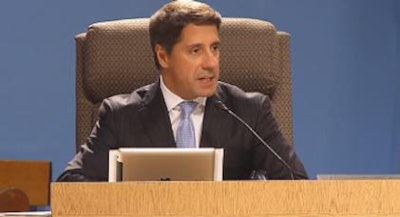 Alberto Carvalho, superintendent of Miami Dade, Fla., public schools, says “we cannot wait” to widely utilize successful strategies for education.
Alberto Carvalho, superintendent of Miami Dade, Fla., public schools, says “we cannot wait” to widely utilize successful strategies for education.WASHINGTON, D.C. — While the national high school dropout rate among African-American males continues to hover at about 52 percent, the graduation rate among Black males in Miami Dade, Fla., has risen to about 70 percent, surpassing school districts in most urban areas across the country.
The good news was revealed yesterday at the annual conference of the Congressional Black Caucus Foundation and provides a glimpse of hope to counter what has been one of the nation’s most vexing education problems.
Still, Alberto Carvalho, who is the school superintendent of the fourth largest school district in the nation, said that more work still needs to be done to improve the numbers.
“The time is now. We cannot wait,” said Carvalho, who moderated a spirited panel discussion that focused on highlighting successful initiatives that have resulted in closing the achievement gap among African-Americans. “If we are to look seriously at the problems of our country, we have to admit that the crisis that Black males face is a shocking abomination.”
Despite the dismal situation that young Black males face, David J. Johns, the executive director of the White House Initiative on Educational Excellence for African-Americans said that “we have an opportunity to talk differently about our challenges” by examining the best practices of school districts and programs that have done a better job in grappling with the crisis.
Johns, for example, pointed to the work of the Eagle Academy, an all-boys public school in New York City that boasts a 100 percent graduation rate, while Larry Martin of Medgar Evers College pointed out that the school’s Male Development and Empowerment Center has had success in improving the school’s retention rate.
“This is an all hands on deck moment,” said the former elementary school teacher, who added that the Obama administration has launched a new effort to recruit 10,000 new minority teachers to the classroom.
Dr. Aisha Ray, senior vice president for academic affairs and dean of faculty at the Erikson Institute, said that early investment into early childhood programs like Head Start is needed to counter the cycle of poverty that is closely correlated to high school dropout rates.
“If we live in an economy with restricted resources and are looking for the greater bang for our buck, early childhood is the ticket we should purchase,” said Ray.
In addition to the panel on Black achievement, other panel sessions at the conference included an examination of the AIDS epidemic and immigration reform.
David Wright, an aspiring teacher, said that he is inspired that things are beginning to turn around. “I want to help mentor African-American boys and continue to help turn the tide,” said Wright, who came to the conference in search of successful models that have helped to decrease high dropouts among African-Americans. “At the end of the day, it takes each one of us working collaboratively to make a difference.”


















